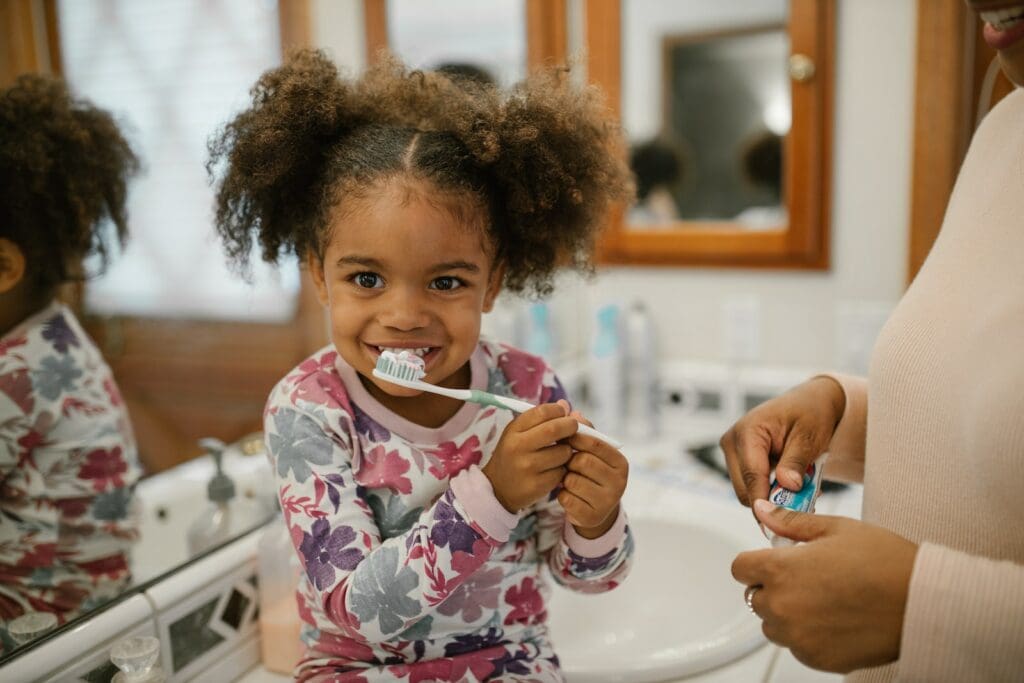
Brushing your teeth is an essential part of your daily routine, but did you know that brushing your tongue is just as important? The tongue is a breeding ground for bacteria, and if left untreated, it can lead to bad breath, plaque buildup, and other oral health conditions. In this article, we will explore why brushing your tongue is crucial for maintaining good oral health.
According to a literature review, a build-up of biofilm on the tongue is one of the most common causes of bad breath, also known as halitosis. Brushing your tongue can help remove this biofilm and reduce unwanted mouth bacteria that can lead to bad breath. Additionally, tongue cleaning can help prevent a condition called black hairy tongue, which occurs when the papillae on the tongue become elongated and trap bacteria and other debris.
There are several ways to clean your tongue, including using a tongue scraper, a toothbrush, or a tongue brush. Each method has its benefits, and it’s essential to find the one that works best for you. In the following sections, we will explore these different methods in more detail and explain how to clean your tongue properly.
The Anatomy of the Tongue and Its Role
The tongue is a muscular organ located in the oral cavity. It is covered with moist, pink tissue called mucosa and is responsible for several essential functions, including speech, taste, and swallowing. The tongue is composed of various muscles that allow it to move freely in different directions.
The tongue’s surface is covered with small bumps called papillae, which are responsible for detecting different tastes. There are four types of papillae: filiform, fungiform, circumvallate, and foliate. Filiform papillae are thread-like in appearance and are located on the front two-thirds of the tongue. They do not contain taste buds and are responsible for detecting texture and temperature. Fungiform papillae are mushroom-shaped and are located on the tip and sides of the tongue. They contain taste buds and are responsible for detecting sweet, sour, bitter, and umami tastes.
The tongue also plays a crucial role in salivation. Salivary glands are located in the tongue’s submucosa and produce saliva, which helps to moisten and lubricate the mouth. Saliva also contains enzymes that aid in the digestion of food.
In addition to its sensory and salivary functions, the tongue is also responsible for speech. The tongue’s muscles, along with other structures in the mouth, help to form sounds and words. Without proper tongue positioning, it is not possible to speak clearly.
Overall, the tongue is a complex and essential organ that plays several vital roles in our daily lives. Brushing the tongue is an important part of oral hygiene, as it helps to remove bacteria and prevent bad breath.
Understanding the Importance of Oral Hygiene
Oral hygiene is an essential aspect of maintaining good overall health. It involves taking care of your teeth, gums, and tongue to prevent dental problems such as cavities, gum disease, and bad breath. Poor oral hygiene can lead to serious health issues, including heart disease, stroke, and diabetes.
Brushing your teeth twice a day is an essential part of oral hygiene. It helps remove plaque, a sticky film of bacteria that can cause tooth decay and gum disease. However, brushing alone is not enough to maintain good oral health. Flossing and using mouthwash are also important steps to remove food particles and bacteria from hard-to-reach areas in the mouth.
In addition to brushing, flossing, and using mouthwash, it is also crucial to clean your tongue regularly. Bacteria can accumulate on the surface of the tongue, leading to bad breath and other dental problems. Brushing your tongue with a toothbrush or using a tongue scraper can help remove bacteria and keep your breath fresh.
Maintaining good oral hygiene is not just about preventing dental problems. It is also linked to whole-body health. Research has shown that poor oral health can increase the risk of heart disease, stroke, and diabetes. Taking care of your teeth, gums, and tongue is an essential part of maintaining good overall health.
In summary, oral hygiene is critical for maintaining healthy teeth, gums, and tongue. It involves brushing, flossing, using mouthwash, and cleaning your tongue regularly. By taking care of your oral health, you can prevent dental problems and reduce the risk of serious health issues.
The Link Between Tongue and Bad Breath
Brushing your tongue is an essential part of maintaining good oral hygiene. Bacteria can accumulate on the surface of your tongue, leading to bad breath, also known as halitosis. Halitosis is caused by volatile sulfur compounds and odor-causing compounds produced by the bacteria in your mouth.
Research has shown that a build-up of biofilm on the tongue is one of the most common causes of bad breath. A literature review concludes that tongue coating and tongue brushing can significantly reduce halitosis. Therefore, it is important to brush your tongue regularly to prevent bad breath.
Chronic halitosis can be a sign of periodontitis, a serious gum disease. In such cases, brushing your tongue may only provide temporary relief. Therefore, it is recommended to visit a dentist or a periodontist for a checkup if you have chronic bad breath.
Brushing your tongue not only helps to eliminate bad breath, but it also improves the appearance of your tongue. The bacteria on your tongue can cause tooth decay, and it’s easily transferable from tongue to the tooth when talking or eating. Therefore, scraping your tongue may be beneficial in preventing tooth decay.
In summary, brushing your tongue is an essential part of maintaining good oral hygiene. It helps to eliminate bad breath, prevents tooth decay, and improves the appearance of your tongue. It is recommended to brush your tongue at least twice a day, along with brushing and flossing your teeth.
Why Brushing Your Tongue is Essential
Brushing your teeth is an essential part of daily oral hygiene routine, but it’s not enough to maintain good oral health. Neglecting your tongue can lead to a buildup of bacteria, which can cause bad breath, discoloration, and other dental problems. Brushing your tongue is an easy and effective way to remove the bacteria that cause these issues.
The tongue is covered in tiny bumps called papillae, which can trap bacteria and food particles. Brushing your tongue helps to remove these particles and bacteria, preventing them from building up and causing bad breath and other dental problems. A buildup of bacteria on the tongue can also lead to the formation of a biofilm, which can be difficult to remove.
Tongue brushing can be done with a toothbrush or a tongue scraper. A toothbrush is effective at removing bacteria and food particles from the tongue, but a tongue scraper is more effective at removing the buildup of biofilm. Tongue scrapers are available in a variety of shapes and sizes, and can be made of plastic, metal, or silicone.
Microorganisms can also be found on the tongue, and these can cause a variety of dental problems. Brushing your tongue helps to remove these microorganisms, preventing them from causing cavities and other dental issues. By removing the bacteria and microorganisms from your tongue, you can improve your overall oral health and prevent dental problems in the future.
In conclusion, brushing your tongue is an essential part of maintaining good oral hygiene. It helps to remove bacteria, food particles, and microorganisms from the tongue, preventing bad breath and other dental problems. Whether you choose to use a toothbrush or a tongue scraper, make sure to include tongue brushing as part of your daily oral hygiene routine.
Tools for Cleaning Your Tongue
There are several tools available for cleaning your tongue, including tongue scrapers, toothbrushes, and mouthwash. Each tool has its advantages and disadvantages, and the best choice for you will depend on your personal preference and needs.
Tongue Scrapers
Tongue scrapers are a popular tool for cleaning the tongue. They are typically made of metal or plastic and have a curved shape that fits comfortably on the tongue. To use a tongue scraper, simply place the scraper at the back of your tongue and gently pull it forward, removing any debris or bacteria along the way.
Tongue scrapers are generally considered to be more effective than toothbrushes at cleaning the tongue. They are also easy to use and can be cleaned and reused multiple times. However, some people may find tongue scrapers uncomfortable or difficult to use.
Toothbrushes
Toothbrushes are another tool that can be used to clean the tongue. Soft-bristled toothbrushes are recommended for this purpose, as they are gentle on the tongue and will not cause irritation. To use a toothbrush to clean your tongue, simply brush your tongue in a back-to-front motion, using gentle pressure.
While toothbrushes are not as effective as tongue scrapers at cleaning the tongue, they are still a good option for people who prefer not to use a scraper. Toothbrushes are also readily available and can be used as part of your regular oral hygiene routine.
Mouthwash
Mouthwash can also be used to clean the tongue. Simply swish the mouthwash around your mouth for 30 seconds to a minute, making sure to coat your tongue as well. Mouthwash can help kill bacteria and freshen your breath, but it is not as effective at removing debris from the tongue as tongue scrapers or toothbrushes.
In conclusion, there are several tools available for cleaning your tongue, including tongue scrapers, toothbrushes, and mouthwash. Each tool has its advantages and disadvantages, and the best choice for you will depend on your personal preference and needs.
The Technique of Tongue Cleaning
Cleaning the tongue is an important part of maintaining good oral hygiene. It is recommended that individuals clean their tongue at least once a day to remove bacteria and prevent bad breath. There are several methods for cleaning the tongue, and it is important to find a technique that works best for each individual.
One common method for cleaning the tongue is to use a tongue scraper. A tongue scraper is a tool made of plastic or metal that is designed to scrape the surface of the tongue. To use a tongue scraper, the individual should start at the back of the tongue and gently scrape forward. It is important to avoid applying too much pressure, which can cause discomfort or trigger the gag reflex.
Another method for cleaning the tongue is to use a toothbrush. To clean the tongue with a toothbrush, the individual should brush the tongue in a circular motion, starting at the back and moving forward. It is important to use a soft-bristled toothbrush to avoid causing any damage to the tongue.
Some individuals may find that they have a sensitive gag reflex, which can make it difficult to clean the tongue. To reduce the gag reflex, it is recommended to breathe through the nose while cleaning the tongue. It may also be helpful to start cleaning the tongue at the front and gradually work towards the back.
Overall, cleaning the tongue is an important part of maintaining good oral hygiene. By using a tongue scraper or toothbrush, individuals can remove bacteria and prevent bad breath. It is important to find a technique that works best for each individual and to avoid applying too much pressure or triggering the gag reflex.
Potential Tongue-Related Health Issues
Brushing your tongue is not just important for fresher breath, but it can also help prevent a range of tongue-related health issues. Neglecting your tongue can lead to a buildup of bacteria, debris, and dead cells, which can cause a variety of problems. Below are some of the potential tongue-related health issues that can arise if you don’t brush your tongue regularly.
Hairy Tongue
Hairy tongue is a condition in which the papillae on the tongue grow longer than usual, giving the tongue a hairy appearance. This condition is caused by a buildup of dead skin cells on the tongue, which can be exacerbated by poor oral hygiene. Brushing your tongue can help remove the dead skin cells and prevent the buildup of bacteria that can cause hairy tongue.
Black Hairy Tongue
Black hairy tongue is a condition that occurs when the papillae on the tongue grow longer and become discolored. This condition is caused by a buildup of bacteria and debris on the tongue, and it can be exacerbated by poor oral hygiene. Brushing your tongue can help remove the bacteria and debris that cause black hairy tongue and prevent the condition from developing.
Thrush
Thrush is a fungal infection that can affect the tongue and other parts of the mouth. It is caused by an overgrowth of the Candida fungus, which can occur when the balance of bacteria in the mouth is disrupted. Brushing your tongue can help maintain the balance of bacteria in the mouth and prevent the overgrowth of Candida that can cause thrush.
Leukoplakia
Leukoplakia is a condition in which white or gray patches develop on the tongue and other parts of the mouth. It is often caused by irritation or damage to the mucous membranes in the mouth, and it can be exacerbated by poor oral hygiene. Brushing your tongue can help remove the bacteria and debris that can irritate the mucous membranes and prevent the development of leukoplakia.
Oral Cancer
Oral cancer can develop on the tongue and other parts of the mouth. It is often caused by exposure to carcinogens, such as tobacco and alcohol, but poor oral hygiene can also increase the risk of developing oral cancer. Brushing your tongue can help remove the bacteria and debris that can contribute to the development of oral cancer and reduce the risk of developing the disease.
Underlying Health Problems
Poor oral hygiene can also contribute to a range of underlying health problems, including bronchitis, gastrointestinal disorders, tonsillitis, sinus infections, kidney disease, and liver problems. These health problems can be caused by the spread of bacteria from the mouth to other parts of the body. Brushing your tongue can help remove the bacteria that can contribute to these health problems and reduce the risk of developing them.
Expert Opinions on Tongue Cleaning
Dentists, the Mayo Clinic, and the American Dental Association all agree that cleaning your tongue is an essential part of oral hygiene. They recommend brushing your tongue gently with a soft-bristled toothbrush or using a tongue scraper to remove bacteria and food particles that can cause bad breath and affect your overall oral health.
According to the American Dental Association, “Cleaning your tongue can help freshen your breath and clean your mouth by removing bacteria.” The Mayo Clinic also states that “Brushing or scraping your tongue can help remove bacteria and other debris that contribute to bad breath.”
Dentists also recommend tongue cleaning as a way to prevent a condition called black hairy tongue, where the tongue can become discolored and appear hairy due to a buildup of dead skin cells, bacteria, and food particles. Regular tongue cleaning can help prevent this condition from occurring.
In addition to improving oral health, tongue cleaning may also have other health benefits. A study published in the Journal of Periodontology found that tongue cleaning can reduce the risk of pneumonia in elderly people by removing harmful bacteria in the mouth.
Overall, experts agree that cleaning your tongue should be a part of your daily oral hygiene routine to maintain good oral health and prevent bad breath.



